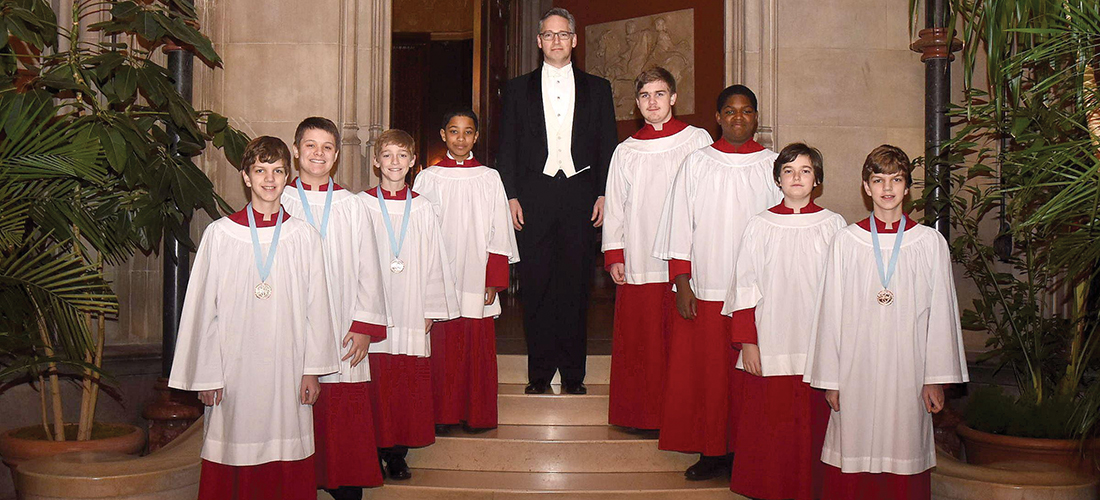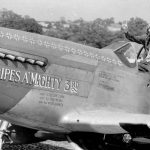
Lifting up Voices — and Lives
The Burlington Boys Choir celebrates its 60th anniversary
By Grant Britt
They have the voices of angels, regaling listeners with heavenly treatments of classical compositions. But this celestial choir is earthbound, with the will and attention span of little boys. For 60 years, the Burlington Boys Choir has been making vocal angels out of young males under the age of 9, “the magic age,” says Director Bill Allred, “because they’re really starting to think independently, and those are the boys who are ready to begin reading music off a page.”
It takes a certain type of boy, he says, to go the distance. Michael Stone is the choir’s newest member. At the age of 9, he’s prepared to take on the challenges of the choir’s activities, which include hours of rehearsal, learning to sing in foreign languages as well as traveling to perform.
Michael says he was recommended by his school’s elementary music and choir teacher Mrs. Schmidt to try out for the boys choir. He rates his favorite activities as singing in school, boys choir, art, and Pokémon.
Former choirboy Chauncey Patterson, a Burlington resident whose viola skills have taken him all over the world, says the choir changed his life. “The Boy’s choir was such a huge part of my early life, I still think about it to this day even though I’ve had so many other things to do, but it really was life-shaping for me, and career shaping, ultimately for me.”
It’s difficult to accomplish in this overscheduled day and age, with its myriad electronic distractions, but Allred says once he does get new musical recruits, retaining them “is not a problem.” For a stint in the Burlington Boys Choir is nothing short of a transforming experience. “It was easy to focus — we rehearsed Monday, Wednesday and Friday, as I recall, and I think on Saturday mornings, four rehearsals a week, so we were pretty focused. That was what we did, that was our life, really,” Patterson says. “We went to school. I took viola lessons, and later on I started playing tennis and that sort of thing. But the Boy’s Choir, while I was in it . . . it was my life.”
The choir is a vision realized by founder and director Eva Wiseman, a dynamo from Spencer, N.C., who, with a degree in music education from Spartanburg, S.C., and a master’s in voice from Columbia University in New York City, landed in Alamance County in the late 1930s as the Burlington City Schools’ director of music. After attending a concert of the renowned Vienna Boys Choir at Elon College, she was inspired to channel her boundless energy toward a new mission and founded the Burlington Boys’ Choir in 1959, now the oldest one of its kind in North Carolina. (The contenders, Durham Boys’ Choir is 30, and the Raleigh Boys’ Choir is 51 years old.)
Over a period of 35 years, Wiseman trained some 500 young voices, teaching them, not only the intricacies of choral music, but also discipline and life lessons, while establishing a respected national and international reputation for the group. Under her guidance, the choir performed 400 concerts throughout the United States and Europe, some for statesmen and presidents, as Patterson recalls: “We went to Europe in the Boy’s Choir; that was my first time,” he says. “I was in the first choir that went to the White House to sing for Nixon in the early ’70s. We sang for the lighting of the Christmas tree.”
Patterson was that “magic age,” 8 years old, when he was accepted into the Boys Choir. “I was at Sellars Gunn Elementary school there back before the school system had been desegregated, and the music teacher called me out of my class to come in and see a woman and sing for her, “She asked me to match notes on the piano,” he remembers. “I didn’t know anything about it, not even sure my parents knew anything about it at this point. And I sang for this woman, and that’s how it all started.”
Wiseman — and early on in his tenure as director, Allred, too — had the advantage of recruiting boys through the Alamance public schools. Allred used to visit five or six schools in a week and see 100 to 150 kids, in good times culling as many as 20 from the bunch for the three-month choir-training process. But nowadays, very few recommendations are made, and from that, few people actually come to the choir. “It’s very tough,” Allred says. “Thank goodness for the Internet, if a boy has an interest in singing, their parents get online and they go, ‘Oh look, there’s this choir!’ So we’re still there, but we’re much smaller than we used to be. That kind of recruiting just isn’t working anymore, although I still try to do it,” he says.
Michael Stone didn’t take much recruiting. “He always loved and has been interested in music, his mom Stephanie says. “Everybody in the family loves to sing, and the family has always been sort of involved in music. He’s always liked performing and just music in general and all of art, painting and drawing and anything musical.”
Chauncey Patterson was another who benefited from exposure to music during his formative years. “My mom told me much later in my musical career that my dad played Beethoven’s 5th in my nursery for the first two weeks of my life. So I don’t know whether it sank in, or it was something I heard, but I always loved it,” he chuckles.
And, as Allred notes, there are other reasons for sparking a boy’s interest early, if not in the nursery then by Kindergarten or first or second grade, “before they start doing soccer or whatever else their interest might be.” The director has had an idea for some time to start a young choir at a younger age because by the third grade, where he’s recruiting, a lot of them are already into sports or Boy Scouts.”
Despite the difficulty, the current choir that Allred has assembled and directs with the aid of vocal coach/accompanist Woody (Woodson) Faulkner is impressive. At their 60th Anniversary Concert in May at Burlington’s Macedonia Lutheran Church, the 11-member Choir dazzled with an eclectic array of classical and folk music during the hour-long presentation. “I don’t do anything I don’t like,” Allred says. “I don’t like pop music, and some people have said over the years, ‘You can probably get more boys if you did stuff from the radio. It’s more fun.’ But I think they get exposed to that stuff plenty; I want to teach stuff they’re not going to hear and develop a taste for that kind of music and an appreciation for it.”
But Allred’s disdain for pop doesn’t rule out some Old Broadway tunes: “Never new, ’cause I don’t like that,” he chuckles. “And always a selection of sacred classical as well as secular classical. That was the pattern Miss Wiseman set up for her concerts, sacred and secular, but it also followed a pattern that the Vienna Boys choir and others types of boys choirs in Europe do when they have a concert.”
And just because it’s classical doesn’t mean it can’t inspire some laughter. The Bach piece the Choir performed, “Ich jauchze, Ich lache mit Schall,” which translates as Laughing and Shouting for Joy, sounds like a bit like a carousel, an old-time merry-go-round. “As I pointed out in the concert, that’s about laughing, so it should have a joyful quality and that laughing motive maybe comes out as a little jumpy and maybe that’s where that carousel image comes from,” Allred says. Whatever the motive, it still invokes smiles on audience members’ faces. “That’s exactly what Bach would have wanted, I think,” Allred says.
Bach and his buddies would have also been proud of the influence that singing their music has had on the boys over the years. After the 11-member choir had made its presentations, Allred polled the audience for past members in attendance, starting with original 1959 members. By the time he finished the roll call, half the church was standing, and the Alumni choir — summoned up front to perform a couple of Irish Folk songs and an African Prayer with the Boys Choir — flooded the front of the church.
“The distance in years is so great for us, our alumni, it was in their childhood, so the fact that there are some boys who consider it an important part of their life, even though it was way back, is very gratifying.”
Patterson would be among the first to agree. “If you put it in a historical perspective, the late ’60s, early ’70s in Burlington, North Carolina, totally different racial atmosphere, social atmosphere.” His neighborhood was very segregated, and his life was very much centered around the African-American community. “It was a bit taboo among my friends to have white friends, which I looked at a little weird. So being in the boys choir, I was exposed to that at a very early age.” He credits Eva Wiseman, whom he describes as “this incredible force,” with imparting life lessons — “ how to tie a tie, how to dress, we learned to keep your shoes shined, it was really great molding, she taught us to be gentlemen.” He says that stayed with him for a long time. “To this day, certain things: manners, table etiquette – there’s a whole book we had with this stuff. When you got in the choir you got the handbook, it told you how to act, how to dress, when you traveled — how to address people, how to dress yourself, how to act in a restaurant, how to act in a person’s house — all sorts of things, it was terrific.”
Concurrent with his entry into the Boys Choir, Patterson developed another musical interest — the viola — which he ultimately parlayed into performing at the Eastern Music Festival. The experience would launch his career, starting as the principal viola slot in the Denver Symphony and then the Buffalo Philharmonic Orchestra. Patterson’s viola skills earned him a 15-year stint with the globetrotting Miami String Quartet. Currently residing in Miami, the Burlington native now holds down the solo viola slot with the Florida Grand Opera, is the principal viola with the Palm Beach Symphony, is a member of the Nu Deco Ensemble in Miami, as well as an associate professor of chamber music at Lynn University Conservatory of Music in Boca Raton.
As for Allred, he keeps battling to sustain the tradition that Wiseman started 60 years ago, though finances are tight. In years past, the Choir would perform 25 to 30 Sundays a year in church. Now people have other things to do on Sundays, and the Choir only sings in churches on Sunday once or twice a year. To counteract that, two years ago Allred started an annual Love Feast, a traditional Moravian service of readings and carols, with the Choir held on the 13th and 21st of December at Old Brick Church, 3699 Brick Church Road in Burlington.“It’s gotten to be very popular,” Allred says of the free event. “People are returning to it; it continues to grow as another way to keep the Boys Choir in front of the public and raise money for us.” He’s also been in talks with the Raleigh Boys Choir and Durham Boys Choir about holding a joint performance or starting a festival (no mean feat, considering that past directors of all three choirs once refused to have anything to do with one another).
Keeping the choir in the public eye is not only about preserving musical tradition and an appreciation for the fine arts, but also as a living testimony to what a positive influence it has on young lives and keeps on giving — for a lifetime.
“I like that he has an interest and he enjoys doing this- he’s mentioned how much he likes to sing and wants to continue to sing in the future,” Stephanie Stone says of son Michael’s involvement. “Any exposure to music, learning to read music, learning about pitch and control is obviously very valuable in that regard. And also working and performing in a group, you learn a lot of lessons working with others. I think that the camaraderie of that and the experience, getting on stage you learn a lot of lessons in performing together, learning music, and the experience as a whole.”
Patterson still considers it the experience of a lifetime. “If it had not been for the Boys Choir, I might have played the viola but my life. . . I had such a head start with other kids because of the ear training and all the training and all the music I was exposed to at such an early age, it really gave me an advantage,” Patterson says. “It was wonderful. It changed my life.” OH
Grant Britt is a Greensboro-based writer. He’s no choirboy.





